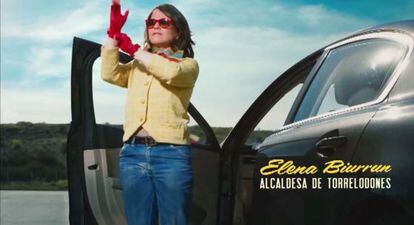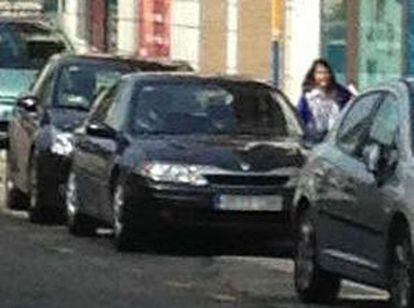The political dangers of setting an example
The mayor of a Madrid suburb claimed to have given up her official car, but she has had to go on the defensive after photos emerged of her using the vehicle


The story made it into some of the world's leading newspapers, including The New York Times and The Washington Post: Elena Biurrún, the new independent mayor of Torrelodones, had given up her official chauffeur-driven car in a gesture that spoke about incipient change in a country teeming with public profligacy and corrupt politicians.
Biurrún even appeared in a sports drinks commercial together with other mayors who were being held up as role models of good management. In the ad, Biurrún steps out of a car as a voice in the background says: "Whatever happened to Elena, who parked her official car to save the town a little money?"
But it wasn't quite true: Biurrún has continued to use an official car, which is still driven by a municipal chauffeur.
Photographs taken on June 10, to which EL PAÍS has had access, show Biurrún and Santiago Fernández — her husband and the Torrelodones city planning commissioner — getting into the official city car.
A local spokesman confirmed that the mayor used the car that day to attend a meeting. "The car continues to be used, but only for town hall-related events. And not just by the mayor," said Ángel Guirao, the local head of communications.
"Caught? Have I ever hidden from anyone or anything? I've nothing to hide. What a salacious headline!" Biurrún wrote on her Twitter account after seeing the story in EL PAÍS. "There is no official mayor's car," she added in another message.
Asked on Twitter what the car is used for, Biurrún replied that it is driven by employees and municipal workers for notifications, municipal procedures and to get from one place to another. "And I can probably think of more things," she added.
Meanwhile, the city of Torrelodones — a municipality of around 20,000 residents 30 kilometers northwest of the capital, which mainly serves as a commuting base for well-heeled Madrileños — issued its own Twitter message: "We occasionally make use of municipal vehicles when necessary. Nothing to hide." The message also urged people to consult the list of the more than 30 official cars "either owned or rented" that the city has at its disposal.

Guirao said that things were very different under the previous mayor, Carlos Galbeño of the Popular Party (PP), which governed in the town for over two decades before Biurrún took over in 2011 with her independent group Vecinos por Torrelodones (VxT).
"The previous mayor used the official car for everything, even to go on personal vacations," he said. It is true that the new administration got rid of the vehicle that was used by Galbeño, a leased Volkswagen Passat. But it kept the Renault Laguna. As for the chauffeur, Guirao says that he now also performs other tasks such as delivering official notices to residents' mailboxes or unlocking municipal facilities when they are needed outside regular working hours.
VxT has often referred to the sports drinks commercial as an indication of the group's way of doing things. The party website shows a picture of the mayor crossing a road under the heading " Políticos de anuncio," which has the double meaning of "politicians who show up in commercials" and "exemplary politicians." In a television interview with the private network Cuatro, Biurrún stated: "We pay for our own expenses, our cars, our gasoline. The previous mayor had an official car. I'd like someone to explain to me why there is such a need for official cars. I can't get my head around that. It's a matter of esthetics over economics. You shouldn't go around in a car that isn't yours."
Her attitude was reflected in stories that ran in The Wall Street Journal, which quoted Biurrún as saying that she was "so indignant seeing what these people had been doing with everyone's money as if it were their own," in reference to the previous PP administration, and in The New York Times, which also hailed her cost-cutting attitude.
But opposition groups have reacted angrily to the new government's holier-than-thou attitude. PP spokesman Javier Laorden said that in times of crisis such as these, parties like Vecinos por Torrelodones use facile rhetoric to convey values that people want to hear about. "But they are only half-truths that ultimately turn into great lies," he said. "The car thing may be anecdotal, but it is a symptom of their way of doing things. For instance, they say they have achieved a budget surplus, but it's not true — they inherited balanced accounts from the PP."
The story of VxT is wrapped in a romantic halo. It was born out of a grass-roots movement created in 2005 to fight a PP plan to build 1,200 homes on 128 hectares of environmentally valuable land. Their success led to the creation of a proper party, and in 2007 VxT ran in municipal elections, earning four seats. Then, four years later, the PP obtained 10 councilors while VxT got nine, but Biurrún reached a deal with the Socialists and Actúa and got herself elected mayor.










































